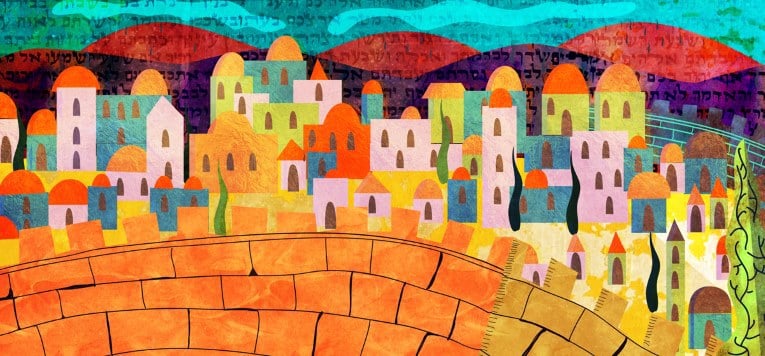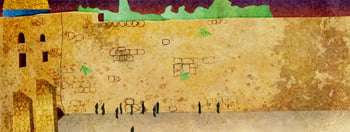LESSONS IN TANYA: Monday, February 3, 2025
LESSONS IN TANYA: Monday, February 3, 2025
HarHaBayit:
'We failed! We didn't throw of the Mountain: Amalek's descendants and their Israeli friends! The Erev Rav! We must be at war until all terrorists are dead! In and around Eretz Yisrael. The day after, we need to vote for an Elohim fearing Government. Then let us start to Pray and to talk about a new government. Every Jew and non-Jew must accept and respect Jewish Law. Voting's yes, but a new high Court system Jewish Law in all Eretz Yisrael: Including Aza, Yudea and Samaria. So that we may become a real blessing for the whole world as it was in the time of the Kingdom of HaMeleg David. Yes, real Teshuva and Study our Source: The Torah. The Sifri (a treatise on the derivation of Torah law from the exegesis of the verses of Numbers and Deuteronomy, written during the time of the Mishnah by Rav) says, "The Jewish people were commanded three mitzvos upon entering Israel: appointing for them-selves a king, building themselves a Sanctuary and wiping out the descendants of Amalek."
Look Click: https://fb.watch/r0HhSftzj1/
Shemot (Exodus) - Chapter 25
8And they shall make Me a sanctuary and I will dwell in their midst חוְעָ֥שׂוּ לִ֖י מִקְדָּ֑שׁ וְשָֽׁכַנְתִּ֖י בְּתוֹכָֽם: And they shall make Me a sanctuary: And they shall make in My name a house of sanctity. וְעָשׂוּ לִי מִקְדָּשׁ: וְעָשׂוּ לִשְׁמִי בֵּית קְדֻשָּׁה: 9according to all that I show you, the pattern of the Mishkan and the pattern of all its vessels; and so shall you do. טכְּכֹ֗ל אֲשֶׁ֤ר אֲנִי֙ מַרְאֶ֣ה אֽוֹתְךָ֔ אֵ֚ת תַּבְנִ֣ית הַמִּשְׁכָּ֔ן וְאֵ֖ת תַּבְנִ֣ית כָּל־כֵּלָ֑יו וְכֵ֖ן תַּֽעֲשֽׂוּ: according to all that I show you: here, the pattern of the Mishkan. This verse is connected to the verse above it: “And they shall make Me a sanctuary…” according to all that I show you. כְּכֹל אֲשֶׁר אֲנִי מַרְאֶה אֽוֹתְךָ: כָּאן את תבנית המשכן, הַמִּקְרָא הַזֶּה מְחֻבָּר לַמִּקְרָא שֶׁלְּמַעְלָה הֵימֶנּוּ וְעָשׂוּ לִי מִקְדָּשׁ כְּכֹל אֲשֶׁר אֲנִי מַרְאֶה אוֹתְךָ:
Eretz Yisrael in Jewish Scriptures Click: 
אבינו בשמים,
מבצר סלע וגואל ישראל -
לברך את מדינת ישראל,
הנבטה הראשונית של גאולתנו.
Our father in Shamayim (Heaven),
Rock-fortress and redeemer of Yisra’el —
bless the State of Israel,
the initial sprouting of our redemption.
Source (Hebrew) Translation (English)
The Tefilah l’Shalom Medinat Yisra’el (“Prayer for the Welfare of the State of Israel”) was composed by Rabbi Yitsḥak haLevi Hertzog (1888-1959), edited by Shmuel Yosef (S.Y.) Agnon (1888-1970), and first published in the newspaper Ha-Tsofeh on 20 September 1948.
This prayer was instituted at the time by the Chief Rabbis of Israel, Rabbi Hertzog and Rabbi Ben Tsiyon Meir Ḥai Uziel. According to the custom of the Ashkenazic communities, the time for reciting the prayer was set between the end of the Torah reading and the haftara for the return of the Torah scroll to its place in the Holy Ark. In Sephardic communities, it is customary to recite the prayer at the time of the removal of the Torah scroll from the Holy Ark. (At this point in prayer, it was customary the prayer “Hanoten Tshuah”, blessing the ruler of the state and their immediate family.)
Because the State of Israel is referred to as “the beginning of the sprouting/growth of our redemption,” the prayer was not universally accepted. This expression, and the reservations about the state in general, are some of the reasons why non-Zionist and anti-Zionist Jews do not recite it in their synagogues. In fact, the recitation of this prayer and, to a lesser extent, the prayer for the safety of IDF soldiers, became one of the main differences between prayer in Ḥaredi synagogues and prayers in National Religious Zionist synagogues in Israel and in the Diaspora.
מי שברך לחיילי צה״ל | Mi sheBerakh for the Welfare of Israel Defense Forces Soldiers, by Rabbi Shlomo Goren (1956); amended by Dr. Alex Sinclair (2012)
| 8And they shall make Me a sanctuary and I will dwell in their midst | חוְעָ֥שׂוּ לִ֖י מִקְדָּ֑שׁ וְשָֽׁכַנְתִּ֖י בְּתוֹכָֽם: | |
| And they shall make Me a sanctuary: And they shall make in My name a house of sanctity. | וְעָשׂוּ לִי מִקְדָּשׁ: וְעָשׂוּ לִשְׁמִי בֵּית קְדֻשָּׁה: | |
| 9according to all that I show you, the pattern of the Mishkan and the pattern of all its vessels; and so shall you do. | טכְּכֹ֗ל אֲשֶׁ֤ר אֲנִי֙ מַרְאֶ֣ה אֽוֹתְךָ֔ אֵ֚ת תַּבְנִ֣ית הַמִּשְׁכָּ֔ן וְאֵ֖ת תַּבְנִ֣ית כָּל־כֵּלָ֑יו וְכֵ֖ן תַּֽעֲשֽׂוּ: | |
| according to all that I show you: here, the pattern of the Mishkan. This verse is connected to the verse above it: “And they shall make Me a sanctuary…” according to all that I show you. | כְּכֹל אֲשֶׁר אֲנִי מַרְאֶה אֽוֹתְךָ: כָּאן את תבנית המשכן, הַמִּקְרָא הַזֶּה מְחֻבָּר לַמִּקְרָא שֶׁלְּמַעְלָה הֵימֶנּוּ וְעָשׂוּ לִי מִקְדָּשׁ כְּכֹל אֲשֶׁר אֲנִי מַרְאֶה אוֹתְךָ: |

אבינו בשמים, מבצר סלע וגואל ישראל - לברך את מדינת ישראל, הנבטה הראשונית של גאולתנו. | Our father in Shamayim (Heaven), Rock-fortress and redeemer of Yisra’el — bless the State of Israel, the initial sprouting of our redemption. |
| Source (Hebrew) | Translation (English) |
|---|
The Tefilah l’Shalom Medinat Yisra’el (“Prayer for the Welfare of the State of Israel”) was composed by Rabbi Yitsḥak haLevi Hertzog (1888-1959), edited by Shmuel Yosef (S.Y.) Agnon (1888-1970), and first published in the newspaper Ha-Tsofeh on 20 September 1948.
This prayer was instituted at the time by the Chief Rabbis of Israel, Rabbi Hertzog and Rabbi Ben Tsiyon Meir Ḥai Uziel. According to the custom of the Ashkenazic communities, the time for reciting the prayer was set between the end of the Torah reading and the haftara for the return of the Torah scroll to its place in the Holy Ark. In Sephardic communities, it is customary to recite the prayer at the time of the removal of the Torah scroll from the Holy Ark. (At this point in prayer, it was customary the prayer “Hanoten Tshuah”, blessing the ruler of the state and their immediate family.)
Because the State of Israel is referred to as “the beginning of the sprouting/growth of our redemption,” the prayer was not universally accepted. This expression, and the reservations about the state in general, are some of the reasons why non-Zionist and anti-Zionist Jews do not recite it in their synagogues. In fact, the recitation of this prayer and, to a lesser extent, the prayer for the safety of IDF soldiers, became one of the main differences between prayer in Ḥaredi synagogues and prayers in National Religious Zionist synagogues in Israel and in the Diaspora.
Source (Hebrew) Translation (English)
In recent months, thanks to the combination of cell phone cameras and YouTube, we’ve witnessed Israel Defense Force soldiers acting in deeply troubling ways. We’ve seen soldiers standing by while a civilian shoots live ammunition at Palestinian protesters, we saw Lt. Col. Shaul Eisner assault an unarmed Danish civilian with the butt of a rifle, and, before that, the killing at close range of Mustafa Tamimi, a protester in the Palestinian village Nebi Saleh. Many of these occurrences are regularly reported in Haaretz, but they don’t find their way as often, or as prominently, into other media outlets.
The most generous explanation for this phenomenon is that individuals, in a series of isolated incidents, fail to uphold the IDF code of conduct. More sobering explanations point to a widespread culture in the IDF whereby such conduct is tolerated and routine. Indeed, when the Eisner case was reported, the most shocking aspect of the YouTube video was the utter indifference to Eisner’s act by the six or seven other soldiers milling around. What we saw as a horrific, unforgiveable, outrage, they saw as boring and un-noteworthy.
I was on the receiving end of such an incident last year, while I was observing a non-violent demonstration against the occupation in the West Bank, and got caught up in tear gas that was fired indiscriminately at women, children, and observers. Since then, I’ve found it hard to say the prayer for the IDF that appears in all Israeli prayer books, and which my community, like most synagogues in Israel, reads aloud every Shabbat.
The prayer, written by Rabbi Shlomo Goren in the early years of the state, does not, to my mind, adequately respond to the ethical challenges that IDF soldiers face in exercising power over civilian communities, where things are much more complicated than state-against-state war.
But our response to troubling issues cannot simply to be cease from engagement with the issue. That’s true if the troubling issue is, say, Eishet Ḥayil (the poem traditionally sung by a husband to a wife on Friday night; while parts of it are beautiful, parts of it are also rather sexist); and it is also true if the troubling issue is inappropriate use of force by the IDF.
As engaged Jews who love the Jewish tradition but are troubled by particular aspects of it, my wife and I sing an amended version of Eishet Ḥayil on Friday nights. In doing this, we join countless other Jews who try to develop an active relationship with liturgy that more closely reflects their values.
As engaged Jewish Zionists, the time has come to do the same with the prayer for the IDF. Above is my suggested amendation. The text is the regular version of the prayer as found in the popular Rinat Israel siddur. The middle section is my suggested addition.
The Biblical verse quoted is from the story of Sodom and Gemorrah, where Abraham berates God for seeking to harm innocent people along with the wicked. To my mind, it’s an extremely appropriate analogy to much of what goes on today: there are wicked people out there who seek to harm us, and it’s good that the army protects us from them. But all too often, some soldiers (and some Israelis in general) don’t do enough to distinguish between those who are genuinely evil, and innocent people (including Palestinians, left-wing Israelis, and internationals) who are legitimately protesting the occupation. Amending the prayer for the IDF is one way to raise awareness about that uncomfortable fact, and begin a public, Jewish, Zionist conversation about it.
| Source (Hebrew) | Translation (English) |
|---|---|
In recent months, thanks to the combination of cell phone cameras and YouTube, we’ve witnessed Israel Defense Force soldiers acting in deeply troubling ways. We’ve seen soldiers standing by while a civilian shoots live ammunition at Palestinian protesters, we saw Lt. Col. Shaul Eisner assault an unarmed Danish civilian with the butt of a rifle, and, before that, the killing at close range of Mustafa Tamimi, a protester in the Palestinian village Nebi Saleh. Many of these occurrences are regularly reported in Haaretz, but they don’t find their way as often, or as prominently, into other media outlets.
The most generous explanation for this phenomenon is that individuals, in a series of isolated incidents, fail to uphold the IDF code of conduct. More sobering explanations point to a widespread culture in the IDF whereby such conduct is tolerated and routine. Indeed, when the Eisner case was reported, the most shocking aspect of the YouTube video was the utter indifference to Eisner’s act by the six or seven other soldiers milling around. What we saw as a horrific, unforgiveable, outrage, they saw as boring and un-noteworthy.
I was on the receiving end of such an incident last year, while I was observing a non-violent demonstration against the occupation in the West Bank, and got caught up in tear gas that was fired indiscriminately at women, children, and observers. Since then, I’ve found it hard to say the prayer for the IDF that appears in all Israeli prayer books, and which my community, like most synagogues in Israel, reads aloud every Shabbat.
The prayer, written by Rabbi Shlomo Goren in the early years of the state, does not, to my mind, adequately respond to the ethical challenges that IDF soldiers face in exercising power over civilian communities, where things are much more complicated than state-against-state war.
But our response to troubling issues cannot simply to be cease from engagement with the issue. That’s true if the troubling issue is, say, Eishet Ḥayil (the poem traditionally sung by a husband to a wife on Friday night; while parts of it are beautiful, parts of it are also rather sexist); and it is also true if the troubling issue is inappropriate use of force by the IDF.
As engaged Jews who love the Jewish tradition but are troubled by particular aspects of it, my wife and I sing an amended version of Eishet Ḥayil on Friday nights. In doing this, we join countless other Jews who try to develop an active relationship with liturgy that more closely reflects their values.
As engaged Jewish Zionists, the time has come to do the same with the prayer for the IDF. Above is my suggested amendation. The text is the regular version of the prayer as found in the popular Rinat Israel siddur. The middle section is my suggested addition.
The Biblical verse quoted is from the story of Sodom and Gemorrah, where Abraham berates God for seeking to harm innocent people along with the wicked. To my mind, it’s an extremely appropriate analogy to much of what goes on today: there are wicked people out there who seek to harm us, and it’s good that the army protects us from them. But all too often, some soldiers (and some Israelis in general) don’t do enough to distinguish between those who are genuinely evil, and innocent people (including Palestinians, left-wing Israelis, and internationals) who are legitimately protesting the occupation. Amending the prayer for the IDF is one way to raise awareness about that uncomfortable fact, and begin a public, Jewish, Zionist conversation about it.
תְּפִלָּה לְפִדְיוֹן שְׁבוּיִם | Prayer for the Redemption of Israelis Taken Captive [during the war begun on Shemini Atseret 5784], by Rabbi Ofer Sabath Beit Halachmi (2023)
Source (Hebrew) Translation (English)
| Source (Hebrew) | Translation (English) |
|---|---|
This prayer for the liberation of abducted Israeli citizens and military personnel was offered by Rabbi Ofer Sabath Beit Halachmi in response to the war initiated by Hamas from Gaza on Shemini Atseret 5784. The English translation was prepared by Rabbi Dr. Rachel Sabath Beit Halachmi.
| ||||||||||||||||||||||||||||||||||
| ||||||||||||||||||||||||||||||||||
© Copyright Chabad.org · 770 Eastern Parkway Suite 405 · Brooklyn, NY 11213
The Repetition of a Commandment
As is his practice in many Halachos in the Mishneh Torah, the Rambam begins Hilchos Beis HaBechirah, “The Laws of [G‑d’s] Chosen House,” by stating the fundamental mitzvah upon which the entire collection of laws which follow is based:
It is a positive commandment to construct a house for G‑d, prepared to have sacrifices offered within.... as it is written,1 “And you shall make Me a Sanctuary.”
Significantly, the Rambam also mentions the mitzvah of constructing the Beis HaMikdash elsewhere in the Mishneh Torah, in Hilchos Melachim, “The Laws of Kings.” There, however, he focuses on the mitzvah in a different context, stating:2
The Jews were commanded regarding the observance of three mitzvos when they entered Eretz Yisrael: to appoint a king over them.... to wipe out the descendants of Amalek.... and to build [G‑d’s] Chosen House; as it is written,3 “You shall seek out His presence and come to that place.”
The commentaries question: What is the Rambam’s purpose in repeating the commandment to build a Sanctuary in Hilchos Melachim and why in that source does he link together the three mitzvos he mentions?4
The Bond Between These Three Mitzvos
In regard to the latter question, it can be explained that there is an intrinsic connection between these three mitzvos.5 Although they are three separate commandments, the fulfillment of one contributes a measure of perfection to the others. To cite a parallel: The arm tefillin and the head tefillin are two separate mitzvos.6 Nevertheless, when both of these mitzvos are performed together, each one is elevated to a higher level.
Similarly, in regard to the three mitzvos mentioned by the Rambam: The intent is not merely that the mitzvos are to be fulfilled in the chronological order mentioned by the Rambam.7 Instead, the linkage of three mitzvos teaches that the mitzvah of building the Sanctuary can be fulfilled in the most perfect manner, only when first, a king is appointed and then Amalek is destroyed. Similarly, the fulfillment of the mitzvos of destroying Amalek and building a Sanctuary enhance the mitzvah of appointing a king, and the fulfillment of the mitzvah of wiping out Amalek is enhanced by the mitzvos of appointing a king and building the Beis HaMikdash.
This concept is supported by the verses8 cited by the Rambam in the halachah which follows in Hilchos Melachim:9 “And it came to pass, when the king dwelt in his house, and G‑d brought him peace from all the enemies which surrounded him, the king said to the prophet, Natan, ‘Behold, I am sitting in a palace of cedar, [while the Ark of G‑d dwells in curtains].’ ”
These verses indicate how the secure establishment of the monarchy, [“the king dwelt in his house”,] the destruction of Amalek, [“And G‑d brought him peace from all the enemies which surrounded him,”10] and the building of the Beis HaMikdash [David’s request from the prophet Natan] are interrelated.11
Based on the above, we can appreciate a further point: The Rambam’s statements in Hilchos Melachim are based on the Midrash Tanchuma. Nevertheless, he alters the text of that Midrashic passage, choosing a different prooftext. In the Midrash Tanchuma, the prooftext cited for the commandment to build the Beis HaMikdash is the verse: “And you shall make Me a Sanctuary.”12 The Rambam, by contrast, substitutes the verse: “You shall seek out His presence...,” because the context of this verse in the Book of Devarim describes the Jews’ entry into Eretz Yisrael and their progress to a state when “G‑d will grant you peace from all your enemies around you and you will dwell in security.”13
Fulfilling a Mitzvah in Stages
The above concepts also shed light on another related point which has aroused the attention of the commentaries: As mentioned above, the Rambam uses the verse, “And you shall make Me a Sanctuary,” as the prooftext for the mitzvah to build the Beis HaMikdash. This is problematic, for seemingly, this command refers to the construction of the Sanctuary in the desert and not to the construction of the Beis HaMikdash. The passage cited by the Rambam in Hilchos Melachim, by contrast, refers specifically to the construction of the Beis HaMikdash, and indeed, is cited as the source for the commandment to build the Beis HaMikdash by our Sages14 and by our Rabbis.15
It is possible to explain16 that the commandment, “And you shall make Me a Sanctuary,” is general in scope, applying to all the structures which were “a house for G‑d” [i.e., a place where G‑d’s presence was revealed] and “prepared to have sacrifices offered within” [a place for the service of the Jewish people].17 Throughout their history, the Jews fulfilled this commandment in several different ways, beginning with the construction of the Sanctuary in the desert.
In this context, we can resolve a problematic point in Hilchos Beis HaBechirah. Directly after stating the mitzvah to build a Sanctuary, the Rambam continues:
The Sanctuary which Moshe our teacher built is already described in the Torah. It was, however, only temporary in nature....
When [the Jewish people] entered Eretz [Yisrael], they erected the Sanctuary in Gilgal for the fourteen years in which they conquered and divided [the land]. Afterwards, they came to Shiloh and built a structure of stone....
When Eli died, it was destroyed and they came to Nov and built a Sanctuary.18 When Shmuel died, it was destroyed and they came to Givon and built a Sanctuary. From Givon, they came to the [Divine Presence’s] eternal home.
The place of such statements in the Mishneh Torah is problematic. Unlike the Talmud or the Midrashim which are general in content, the Mishneh Torah is exclusively a text of Halachah, Torah law. Points of ethics, philosophy, and history are mentioned only when they are themselves halachos, specific directives governing our conduct. Thus the question can be raised: What halachic points can be derived from the historical background to the construction of the Beis HaMikdash?19
On the basis of the explanation given above, we can, however, appreciate the sequence of these halachos: After the Rambam uses a prooftext which implies that the mitzvah of building a Sanctuary is not confined to one specific structure, he illustrates this point by citing the various different intermediate stages through which our people’s observance of this mitzvah underwent.
Intermediate Way-Stations On the Path to Jerusalem
To return to the concept explained at the outset: The linkage of the mitzvah of constructing a Sanctuary with the mitzvos of appointing a king and wiping out Amalek is also relevant with regard to the other structures mentioned by the Rambam.20 Our Rabbis state that “Moshe Rabbeinu served as a king,”21 and the construction of the Sanctuary followed the war in which Yehoshua defeated Amalek.22
The title “king” was also applied to Yehoshua23 who constructed the Sanctuary at Shiloh, and to Shmuel,24 who constructed the Sanctuary at Nov. We are unsure of the exact time of the construction of the Sanctuary at Givon. We may, however, assume that one of the following — Shaul, David, or Shmuel, all of whom either served, or were described, as kings — was involved in its construction. Similarly, at the time these structures were built, the people had reached progressively more developed stages of being “at peace from the enemies around them.” Nevertheless, just as the monarchy and Israel’s peace had not been established in a complete manner at the time of these structures, these structures did not represent a complete manifestation of the indwelling of the Divine Presence, nor did they fulfill the ideal conception of a center for the sacrificial worship of the Jewish people.
It was not until “the king dwelt in his house, and G‑d brought him peace from all the enemies which surrounded him,” i.e., David had securely established the monarchy and brought peace to the land, that it was possible to build the Beis HaMikdash.
The Ultimate Beis HaMikdash
Based on the above, we can appreciate one of the positive dimensions that will be possessed by the Third Beis HaMikdash. That structure will be built by Mashiach,25 the ultimate Jewish monarch, and will be constructed after he “wages the wars of G‑d, defeating all the nations around him.”26 Among these wars will be the total annihilation of Amalek.27 Thus, since in the Era of the Redemption, the other two mitzvos, the appointment of a king and the destruction of Amalek, will have been fulfilled in a perfect matter, this will contribute an added dimension of perfection to the mitzvah of constructing the Beis HaMikdash.
We can hasten the coming of this era through our divine service. To explain: In chassidic thought,28 the appointment of a king is associated with developing inner bittul, nullifying oneself to G‑d. This in turn allows a person to “drive out” Amalek from his being, to free himself from pride, egotism, and other undesirable character traits. Such personal refinement allows him to proceed further and transform his person, his home, and his surroundings into a “sanctuary in microcosm,” in which the Divine Presence can rest.29
This will serve as a catalyst for change in the world at large. For each particular manifestation of the Divine Presence within the world hastens the coming of the time when the Divine Presence will again be revealed, and not merely in microcosm. At that time, “the world will be filled with the knowledge of G‑d as the waters cover the ocean bed.”30 May this take place in the immediate future.
Adapted from Likkutei Sichos, Vol. VI, Terumah
Adapted from Likkutei Sichos, Vol. VI, Terumah
The Repetition of a Commandment
As is his practice in many Halachos in the Mishneh Torah, the Rambam begins Hilchos Beis HaBechirah, “The Laws of [G‑d’s] Chosen House,” by stating the fundamental mitzvah upon which the entire collection of laws which follow is based:
It is a positive commandment to construct a house for G‑d, prepared to have sacrifices offered within.... as it is written,1 “And you shall make Me a Sanctuary.”
Significantly, the Rambam also mentions the mitzvah of constructing the Beis HaMikdash elsewhere in the Mishneh Torah, in Hilchos Melachim, “The Laws of Kings.” There, however, he focuses on the mitzvah in a different context, stating:2
The Jews were commanded regarding the observance of three mitzvos when they entered Eretz Yisrael: to appoint a king over them.... to wipe out the descendants of Amalek.... and to build [G‑d’s] Chosen House; as it is written,3 “You shall seek out His presence and come to that place.”
The commentaries question: What is the Rambam’s purpose in repeating the commandment to build a Sanctuary in Hilchos Melachim and why in that source does he link together the three mitzvos he mentions?4
The Bond Between These Three Mitzvos
In regard to the latter question, it can be explained that there is an intrinsic connection between these three mitzvos.5 Although they are three separate commandments, the fulfillment of one contributes a measure of perfection to the others. To cite a parallel: The arm tefillin and the head tefillin are two separate mitzvos.6 Nevertheless, when both of these mitzvos are performed together, each one is elevated to a higher level.
Similarly, in regard to the three mitzvos mentioned by the Rambam: The intent is not merely that the mitzvos are to be fulfilled in the chronological order mentioned by the Rambam.7 Instead, the linkage of three mitzvos teaches that the mitzvah of building the Sanctuary can be fulfilled in the most perfect manner, only when first, a king is appointed and then Amalek is destroyed. Similarly, the fulfillment of the mitzvos of destroying Amalek and building a Sanctuary enhance the mitzvah of appointing a king, and the fulfillment of the mitzvah of wiping out Amalek is enhanced by the mitzvos of appointing a king and building the Beis HaMikdash.
This concept is supported by the verses8 cited by the Rambam in the halachah which follows in Hilchos Melachim:9 “And it came to pass, when the king dwelt in his house, and G‑d brought him peace from all the enemies which surrounded him, the king said to the prophet, Natan, ‘Behold, I am sitting in a palace of cedar, [while the Ark of G‑d dwells in curtains].’ ”
These verses indicate how the secure establishment of the monarchy, [“the king dwelt in his house”,] the destruction of Amalek, [“And G‑d brought him peace from all the enemies which surrounded him,”10] and the building of the Beis HaMikdash [David’s request from the prophet Natan] are interrelated.11
Based on the above, we can appreciate a further point: The Rambam’s statements in Hilchos Melachim are based on the Midrash Tanchuma. Nevertheless, he alters the text of that Midrashic passage, choosing a different prooftext. In the Midrash Tanchuma, the prooftext cited for the commandment to build the Beis HaMikdash is the verse: “And you shall make Me a Sanctuary.”12 The Rambam, by contrast, substitutes the verse: “You shall seek out His presence...,” because the context of this verse in the Book of Devarim describes the Jews’ entry into Eretz Yisrael and their progress to a state when “G‑d will grant you peace from all your enemies around you and you will dwell in security.”13
Fulfilling a Mitzvah in Stages
The above concepts also shed light on another related point which has aroused the attention of the commentaries: As mentioned above, the Rambam uses the verse, “And you shall make Me a Sanctuary,” as the prooftext for the mitzvah to build the Beis HaMikdash. This is problematic, for seemingly, this command refers to the construction of the Sanctuary in the desert and not to the construction of the Beis HaMikdash. The passage cited by the Rambam in Hilchos Melachim, by contrast, refers specifically to the construction of the Beis HaMikdash, and indeed, is cited as the source for the commandment to build the Beis HaMikdash by our Sages14 and by our Rabbis.15
It is possible to explain16 that the commandment, “And you shall make Me a Sanctuary,” is general in scope, applying to all the structures which were “a house for G‑d” [i.e., a place where G‑d’s presence was revealed] and “prepared to have sacrifices offered within” [a place for the service of the Jewish people].17 Throughout their history, the Jews fulfilled this commandment in several different ways, beginning with the construction of the Sanctuary in the desert.
In this context, we can resolve a problematic point in Hilchos Beis HaBechirah. Directly after stating the mitzvah to build a Sanctuary, the Rambam continues:
The Sanctuary which Moshe our teacher built is already described in the Torah. It was, however, only temporary in nature....
When [the Jewish people] entered Eretz [Yisrael], they erected the Sanctuary in Gilgal for the fourteen years in which they conquered and divided [the land]. Afterwards, they came to Shiloh and built a structure of stone....
When Eli died, it was destroyed and they came to Nov and built a Sanctuary.18 When Shmuel died, it was destroyed and they came to Givon and built a Sanctuary. From Givon, they came to the [Divine Presence’s] eternal home.
The place of such statements in the Mishneh Torah is problematic. Unlike the Talmud or the Midrashim which are general in content, the Mishneh Torah is exclusively a text of Halachah, Torah law. Points of ethics, philosophy, and history are mentioned only when they are themselves halachos, specific directives governing our conduct. Thus the question can be raised: What halachic points can be derived from the historical background to the construction of the Beis HaMikdash?19
On the basis of the explanation given above, we can, however, appreciate the sequence of these halachos: After the Rambam uses a prooftext which implies that the mitzvah of building a Sanctuary is not confined to one specific structure, he illustrates this point by citing the various different intermediate stages through which our people’s observance of this mitzvah underwent.
Intermediate Way-Stations On the Path to Jerusalem
To return to the concept explained at the outset: The linkage of the mitzvah of constructing a Sanctuary with the mitzvos of appointing a king and wiping out Amalek is also relevant with regard to the other structures mentioned by the Rambam.20 Our Rabbis state that “Moshe Rabbeinu served as a king,”21 and the construction of the Sanctuary followed the war in which Yehoshua defeated Amalek.22
The title “king” was also applied to Yehoshua23 who constructed the Sanctuary at Shiloh, and to Shmuel,24 who constructed the Sanctuary at Nov. We are unsure of the exact time of the construction of the Sanctuary at Givon. We may, however, assume that one of the following — Shaul, David, or Shmuel, all of whom either served, or were described, as kings — was involved in its construction. Similarly, at the time these structures were built, the people had reached progressively more developed stages of being “at peace from the enemies around them.” Nevertheless, just as the monarchy and Israel’s peace had not been established in a complete manner at the time of these structures, these structures did not represent a complete manifestation of the indwelling of the Divine Presence, nor did they fulfill the ideal conception of a center for the sacrificial worship of the Jewish people.
It was not until “the king dwelt in his house, and G‑d brought him peace from all the enemies which surrounded him,” i.e., David had securely established the monarchy and brought peace to the land, that it was possible to build the Beis HaMikdash.
The Ultimate Beis HaMikdash
Based on the above, we can appreciate one of the positive dimensions that will be possessed by the Third Beis HaMikdash. That structure will be built by Mashiach,25 the ultimate Jewish monarch, and will be constructed after he “wages the wars of G‑d, defeating all the nations around him.”26 Among these wars will be the total annihilation of Amalek.27 Thus, since in the Era of the Redemption, the other two mitzvos, the appointment of a king and the destruction of Amalek, will have been fulfilled in a perfect matter, this will contribute an added dimension of perfection to the mitzvah of constructing the Beis HaMikdash.
We can hasten the coming of this era through our divine service. To explain: In chassidic thought,28 the appointment of a king is associated with developing inner bittul, nullifying oneself to G‑d. This in turn allows a person to “drive out” Amalek from his being, to free himself from pride, egotism, and other undesirable character traits. Such personal refinement allows him to proceed further and transform his person, his home, and his surroundings into a “sanctuary in microcosm,” in which the Divine Presence can rest.29
This will serve as a catalyst for change in the world at large. For each particular manifestation of the Divine Presence within the world hastens the coming of the time when the Divine Presence will again be revealed, and not merely in microcosm. At that time, “the world will be filled with the knowledge of G‑d as the waters cover the ocean bed.”30 May this take place in the immediate future.
Adapted from Likkutei Sichos, Vol. VI, Terumah
Adapted from Likkutei Sichos, Vol. VI, Terumah
Israel
The Holy Land
 Art by Sefira Lightstone
Art by Sefira LightstoneFor a Jew, the Land of Israel is more than a place. It is a body for the soul of a people. As Yom Kippur is to the Jewish year, so Israel is to the Jewish space: a place to find where you began, where you belong and what you truly are. A Jew does not travel to Israel, but returns there.
What is this anomaly of the Jewish people and its land, this eternal bond that almost two thousand years of exile have failed to sever? Discover—and uncover—where Israel is in the heart of a Jew, and where the Jewishness is within the heart of Israel.
Source: https://www.chabad.org/library/article_cdo/aid/588018/jewish/Israel.htm
How well do you know the Jewish homeland? Take this quiz and find out!

For a Jew, the Land of Israel is more than a place. It is a body for the soul of a people. As Yom Kippur is to the Jewish year, so Israel is to the Jewish space: a place to find where you began, where you belong and what you truly are. A Jew does not travel to Israel, but returns there.
What is this anomaly of the Jewish people and its land, this eternal bond that almost two thousand years of exile have failed to sever? Discover—and uncover—where Israel is in the heart of a Jew, and where the Jewishness is within the heart of Israel.
Source: https://www.chabad.org/library/article_cdo/aid/588018/jewish/Israel.htm
How well do you know the Jewish homeland? Take this quiz and find out! |
Moshiach and the Future Redemption
Moshiach (also known as messiah or mashiach) is the long awaited Jewish leader who will usher in an era of world peace and G‑dly awareness.
The Jewish messiah is a human being, a descendant of King David, who will lead the Jewish people back to the Land of Israel, where they serve G‑d in peace, leading the nations of the world in attaining an understanding of the Creator.
Messiah will also rebuild the Holy Temple in Jerusalem, establishing an era of peace and prosperity that will endure forever. read more…
Moshiach (also known as messiah or mashiach) is the long awaited Jewish leader who will usher in an era of world peace and G‑dly awareness.
The Jewish messiah is a human being, a descendant of King David, who will lead the Jewish people back to the Land of Israel, where they serve G‑d in peace, leading the nations of the world in attaining an understanding of the Creator.
Messiah will also rebuild the Holy Temple in Jerusalem, establishing an era of peace and prosperity that will endure forever. read more…
Amalek
Nemesis of G‑dliness

The people of Israel journeyed . . . and they camped in Rephidim . . .
[Moses] named the place “Challenge and Strife,” because of the strife of the people of Israel and their challenging of G‑d, saying, “Is G‑d amongst us or not?”
Then came
>Amalek and attacked Israel in Rephidim . . . (Exodus 17:1–8)
Remember what Amalek did to you on the road, on your way out of Egypt. That he encountered you on the way, and cut off those lagging to your rear, when you were tired and exhausted; he did not fear G‑d. Therefore . . . you must obliterate the memory of Amalek from under the heavens. Do not forget. (Deuteronomy 25:17–19)
The Jewish people had just experienced one of the greatest manifestations of divine power in history. Ten supernatural plagues had compelled the mightiest nation on earth to free them from their servitude. The sea had split before them, and manna had rained from the heavens to nourish them. How could they possibly question, “Is G‑d amongst us or not?”
Yet such is the nature of doubt. There is doubt that is based on a rational query. There is doubt that rises from the doubter’s subjective motives and desires. But then there is doubt pure and simple: irrational doubt, doubt more powerful than reason. Doubt that neutralizes the most convincing arguments and the most inspiring experiences with nothing more than a cynical shrug.
Such was the doubt that left the Jewish people susceptible to attack from Amalek. Amalek, in the spiritual sphere, is the essence of baseless, irrational indifference. In the words of the Midrash:
To what is the incident (of Amalek) comparable? To a boiling tub of water which no creature was able to enter. Along came one evildoer and jumped into it. Although he was burned, he cooled it for the others.
So, too, when Israel came out of Egypt, and G‑d split the sea before them and drowned the Egyptians within it, the fear of them fell upon all the nations. But when Amalek came and challenged them, although he received his due from them, he cooled1 the awe of the nations of the world for them.2
This is why Amalek, and what he represents, constitutes the archenemy of the Jewish people and their mission in life. As Moses proclaimed following the war with Amalek, “G‑d has sworn by His throne; G‑d is at war with Amalek for all generations.”3 Truth can refute the logical arguments offered against it. Truth can prevail even over man’s selfish drives and desires, for intrinsic to the nature of man is the axiom that “the mind rules over the heart”—that it is within a person’s capacity to so thoroughly appreciate a truth that it is ingrained in his character and implemented in his behavior. But man’s rational faculties are powerless against the challenge of an Amalek who leaps into the boiling tub, who brazenly mocks the truth and cools man’s most inspired moments with nothing more than a dismissive “So what?”

The people of Israel journeyed . . . and they camped in Rephidim . . .
[Moses] named the place “Challenge and Strife,” because of the strife of the people of Israel and their challenging of G‑d, saying, “Is G‑d amongst us or not?”
Then came
>Amalek and attacked Israel in Rephidim . . . (Exodus 17:1–8)Remember what Amalek did to you on the road, on your way out of Egypt. That he encountered you on the way, and cut off those lagging to your rear, when you were tired and exhausted; he did not fear G‑d. Therefore . . . you must obliterate the memory of Amalek from under the heavens. Do not forget. (Deuteronomy 25:17–19)
The Jewish people had just experienced one of the greatest manifestations of divine power in history. Ten supernatural plagues had compelled the mightiest nation on earth to free them from their servitude. The sea had split before them, and manna had rained from the heavens to nourish them. How could they possibly question, “Is G‑d amongst us or not?”
Yet such is the nature of doubt. There is doubt that is based on a rational query. There is doubt that rises from the doubter’s subjective motives and desires. But then there is doubt pure and simple: irrational doubt, doubt more powerful than reason. Doubt that neutralizes the most convincing arguments and the most inspiring experiences with nothing more than a cynical shrug.
Such was the doubt that left the Jewish people susceptible to attack from Amalek. Amalek, in the spiritual sphere, is the essence of baseless, irrational indifference. In the words of the Midrash:
To what is the incident (of Amalek) comparable? To a boiling tub of water which no creature was able to enter. Along came one evildoer and jumped into it. Although he was burned, he cooled it for the others.
So, too, when Israel came out of Egypt, and G‑d split the sea before them and drowned the Egyptians within it, the fear of them fell upon all the nations. But when Amalek came and challenged them, although he received his due from them, he cooled1 the awe of the nations of the world for them.2
This is why Amalek, and what he represents, constitutes the archenemy of the Jewish people and their mission in life. As Moses proclaimed following the war with Amalek, “G‑d has sworn by His throne; G‑d is at war with Amalek for all generations.”3 Truth can refute the logical arguments offered against it. Truth can prevail even over man’s selfish drives and desires, for intrinsic to the nature of man is the axiom that “the mind rules over the heart”—that it is within a person’s capacity to so thoroughly appreciate a truth that it is ingrained in his character and implemented in his behavior. But man’s rational faculties are powerless against the challenge of an Amalek who leaps into the boiling tub, who brazenly mocks the truth and cools man’s most inspired moments with nothing more than a dismissive “So what?”
The Bottleneck
Amalek attacked Israel “on the road, on [the] way out of Egypt,” as they were headed toward Mount Sinai to receive G‑d’s Torah and their mandate as His people. Here, too, history mirrors the inner workings of the soul: the timing of the historical Amalek’s attack describes the internal circumstances under which the pestilence of baseless doubt rears its head.
In the Passover Haggadah we say: “In every generation one must see himself as if he personally came out of Mitzrayim.” Mitzrayim, the Hebrew word for Egypt, means “narrow straits”; on the personal level, this refers to what chassidic teaching calls the “narrowness of the neck” which interposes between the mind and the heart.
Just as physically the head and the heart are joined by a narrow passageway, the neck, so it is in the spiritual-psychological sense. For while the mind possesses an innate superiority over the heart, it is a most difficult and challenging task for a person to exercise this superiority—to direct and mold his feelings and desires to conform with what he knows to be right. This is the “Exodus from Mitzrayim” that is incumbent on each and every generation: the individual challenge to negotiate the narrow straits of one’s internal “neck,” to overcome the material enticements, the emotional subjectivity, the ego and self-interest which undermine the mind’s authority over the heart and impede its influence on the person’s character and behavior.
As long as a person is still imprisoned in his personal mitzrayim, he faces many challenges to his integrity. As long as he has not succeeded in establishing his mind as the axis on which all else revolves, his base instincts and traits—such as greed, anger, the quest for power and instant gratification—may get the better of him. But once he achieves his personal “Exodus” from the narrow straits of his psyche, once he establishes his knowledge and understanding of the truth as the determining force in his life, the battle is all but won. He may be confronted with negative ideas and rationalizations, but free of the distortions of self-interest, the truth will triumph. He may be tempted by negative drives and desires, but if in his life the mind rules the heart, it will curb and ultimately transform them.
But there remains one enemy which threatens also the post-Exodus individual: Amalek. Amalek “knows his Master and consciously rebels against Him.” Amalek does not challenge the truth with arguments, or even with selfish motivations; he just disregards it. To the axiom, “Do truth because it is true,” Amalek says, “So what?” Armed with nothing but his chutzpah, Amalek jumps into the boiling tub, contests the incontestable. And in doing so, he cools its impact.
Amalek attacked Israel “on the road, on [the] way out of Egypt,” as they were headed toward Mount Sinai to receive G‑d’s Torah and their mandate as His people. Here, too, history mirrors the inner workings of the soul: the timing of the historical Amalek’s attack describes the internal circumstances under which the pestilence of baseless doubt rears its head.
In the Passover Haggadah we say: “In every generation one must see himself as if he personally came out of Mitzrayim.” Mitzrayim, the Hebrew word for Egypt, means “narrow straits”; on the personal level, this refers to what chassidic teaching calls the “narrowness of the neck” which interposes between the mind and the heart.
Just as physically the head and the heart are joined by a narrow passageway, the neck, so it is in the spiritual-psychological sense. For while the mind possesses an innate superiority over the heart, it is a most difficult and challenging task for a person to exercise this superiority—to direct and mold his feelings and desires to conform with what he knows to be right. This is the “Exodus from Mitzrayim” that is incumbent on each and every generation: the individual challenge to negotiate the narrow straits of one’s internal “neck,” to overcome the material enticements, the emotional subjectivity, the ego and self-interest which undermine the mind’s authority over the heart and impede its influence on the person’s character and behavior.
As long as a person is still imprisoned in his personal mitzrayim, he faces many challenges to his integrity. As long as he has not succeeded in establishing his mind as the axis on which all else revolves, his base instincts and traits—such as greed, anger, the quest for power and instant gratification—may get the better of him. But once he achieves his personal “Exodus” from the narrow straits of his psyche, once he establishes his knowledge and understanding of the truth as the determining force in his life, the battle is all but won. He may be confronted with negative ideas and rationalizations, but free of the distortions of self-interest, the truth will triumph. He may be tempted by negative drives and desires, but if in his life the mind rules the heart, it will curb and ultimately transform them.
But there remains one enemy which threatens also the post-Exodus individual: Amalek. Amalek “knows his Master and consciously rebels against Him.” Amalek does not challenge the truth with arguments, or even with selfish motivations; he just disregards it. To the axiom, “Do truth because it is true,” Amalek says, “So what?” Armed with nothing but his chutzpah, Amalek jumps into the boiling tub, contests the incontestable. And in doing so, he cools its impact.
Beyond Reason
How is one to respond to Amalek? How is one to deal with the apathy, the cynicism, the senseless doubt within? The formula that the Torah proposes is encapsulated in a single word: Zachor—“Remember.”
In his Tanya,4 Rabbi Schneur Zalman of Liadi discusses the faith in G‑d that is integral to the Jewish soul. Faith is not something that must be attained; it need only be revealed, for it is woven into the very fabric of the soul’s essence. Faith, continues Rabbi Schneur Zalman, transcends reason. Through faith one relates to the infinite truth of G‑d in its totality, unlike the perception achieved by reason, which is defined and limited by the finite nature of the human mind.
Thus Rabbi Schneur Zalman explains the amazing fact that, throughout Jewish history, many thousands of Jews have sacrificed their lives rather than renounce their faith and their bond with the Almighty—including many who had little conscious knowledge and appreciation of their Jewishness, and did not practice it in their daily lives. At their moment of truth, when they perceived that their very identity as Jews was at stake, their intrinsic faith—a faith that knows no bounds or equivocations—came to light, and overpowered all else.
Amalek is irrational and totally unresponsive to reason; the answer to Amalek is likewise supra-rational. The Jew’s response to Amalek is to remember: to call forth his soul’s reserves of supra-rational faith, a faith which may lie buried and forgotten under a mass of mundane involvements and entanglements. A faith which, when remembered, can meet his every moral challenge, rational or not.

Beit Yisrael International.Become a member.Get the MemberShip from Beit Yisrael! ‘How to become a Righteous of the Nations (Ultra-Orthodox Chassidic/Lost Tribes of Efrayim/‘Ger Toshav‘: Israelite by accepting the Shulchan Aruch and Chasidut, the teachings of CHaBaD, hearing and doing.)
Click: Beit yisrael international
Until........:
Isa 11:9 – 16 They do no evil nor destroy in all My set-apart mountain, for the earth shall be filled with the knowledge of Adonai as the waters cover the sea.Rashi: knowledge of the Lord: [lit.] to know the Lord.10 And on that day, there shall be a Root of Yishai, standing as a banner to the people. Unto Him the nations shall seek, and His rest shall be esteem.Rashi: as a banner for peoples: that peoples should raise a banner to gather to him.11 And it shall be in that day that Adonai sets His hand again a second time to recover the remnant of His people who are left, from Ashshur and from Mitsrayim, from Pathros and from Kush, from Ěylam and from Shin‛ar, from Ḥamath and from the islands of the sea.Rashi: a second time: Just as he acquired them from Egypt, when their redemption was absolute, without subjugation, but the redemption preceding the building of the Second Temple is not counted, since they were subjugated to Cyrus.and from the islands of the sea: the islands of the Kittim, the Romans, the descendants of Esau.And he shall raise a banner: Perka, perche in O.F. [i.e., the verse is literally referring to the pole upon which the banner is attached.] And it shall be for a sign to gather to him and to bring the exiles of Israel to Him as a present.12 And He shall raise a banner for the nations, and gather the outcasts of Yisra’ěl, and assemble the dispersed of Yehuḏa from the four corners of the earth.13 And the envy of Ephrayim shall turn aside, and the adversaries of Yehuḏa be cut off. Ephrayim shall not envy Yehuḏa, and Yehuḏa not trouble Ephrayim.Rashi: Ephraim shall not envy Judah: The Messiah, the son of David, and the Messiah, the son of Joseph, shall not envy each other.14 But they shall fly down upon the shoulder of the Philistines toward the west; together they plunder the people of the east, their hand stretching forth on Eḏom and Mo’aḇ, and the children of Ammon shall be subject to them.Rashi: And they shall fly of one accord against the Philistines in the west: Heb. בְכָתֵף. Israel will fly and run of one accord against the Philistines who are in the west of Eretz Israel and conquer their land. [כָּתֵף, lit. a shoulder, is used in this case to denote unity. The word שֶׁכֶם, also lit. a shoulder, is used in a similar sense.] Comp. (Hoshea 6:9) “They murder on the way in unison (שֶׁכְמָה) ”; (Zeph. 3:9) “One accord (שְׁכֶם אֶחָד).” And so did Jonathan rendered it: And they shall join in one accord to smite the Philistines who are in the west.and the children of Ammon shall obey them: As the Targum states: Will hearken to them. They will accept their commandments over them.15 And Adonai shall put under the ban the tongue of the Sea of Mitsrayim, and He shall wave His hand over the River with the might of His Spirit, and shall strike it in the seven streams, and shall cause men to tread it in sandals.Rashi: And… shall dry up: [lit. shall cut off] to dry it, so that the exiles of Israel will pass through it from Egypt.over the river: The Euphrates River, for the exiles from Assyria to cross.with the strength of His wind: Heb. בַּעְיָם. This is hapax legomenon in Scripture, and according to the context it can be interpreted as “with the strength of His wind.”into seven streams: into seven segments, for the aforementioned seven exiles: from Assyria and from Egypt, etc. Those from the islands of the sea are not from that side.and He shall lead: the exiles within it.with shoes: on dry land.16 And there shall be a highway for the remnant of His people, those left from Ashshur, as it was for Yisra’ěl in the day when he came up from the land of Mitsrayim.Rashi: And there shall be a highway: in the midst of the water for the remnant of His people.
Together we Triumphby Gal Einai February 28, 2024
"And they shall fly down upon the shoulder of the Philistines on the west; together shall they spoil the children of the east; they shall put forth their hand upon Edom and Moav; and the children of Amon shall obey them."(Isaiah 11:14)This verse refers to the days of Mashiach, when the Nation of Israel will defeat all its surrounding enemies. The verse is particularly relevant to us today, while we are fighting in Gaza. The Gaza Strip is the ancient “land of the Philistines.” Today’s “Palestinians” are the Arabs who live in Gaza, on Israel’s western flank, on the sea.To defeat the Philistines, we have to be united, as is written in the same prophecy about the ingathering of the distant members of the Nation of Israel and the unity between Judah and Efraim. “And they shall fly down upon the shoulder of the Philistines on the west.” Rashi explains: “Israel will fly and run with one shoulder upon the Philistines who are in the west of the Land of Israel and will conquer their land.” We have to be “with one shoulder” – united, shoulder-to-shoulder. Today, we can also add that “And they shall fly down” can be understood literally as the defeat of the Palestinians with Israel’s air force. Our soldiers will spread their wings and fly to destroy the enemy and assist the ground forces in their conquest of Gaza.We receive the power of “one shoulder” from Joseph, who is buried in Shechem (In Hebrew, Shechem is both the name of the city and means “shoulder”). Shechem is the city of the covenant, as we say in Psalms 80:2 “The shepherd of Israel, listen, He Who leads Joseph like a flock – appear, He Who is enthroned upon the cherubs.” (And in gematriah, עפו = יוסף: “shall fly” equals “Joseph”).The concept of “one shoulder” is connected to the ultimate Messianic purpose of rectification of the world, when all people will recognize God and the Torah of Moses: “For then will I turn to the peoples a pure language that they may all call upon the name of God, to serve Him with one shoulder.”[1] The current war in the land of the Philistines in the west, on the shores of the Great Sea, is particularly associated with the clarification and rectification of the Western world and Western culture, reaching to the US on the other side of the world.Triumph in the land of the Philistines is the realization of the promise in the Torah, “And I will place your border from the Red Sea until the Sea of the Philistines and from the desert to the river, for I will give the dwellers of the land into your hands and you shall expel them from before you.”[2] This is our map of the “New Middle East’: “From the Red Sea to the Sea of the Philistines” including the entire Sinai Peninsula. (Surrendering Sinai to Egypt 45 years ago was the root of all further surrenders and retreats). “From the desert to the river” – From the Sinai desert in the southwest until the Euphrates in the northeast. This includes the elimination of the combined threat from Syria-Iraq-Iran. And so in Isaiah’s prophecy, “together shall they spoil the children of the east” – the defeat of the enemies to the east (such as the hostile nations on the Arabian Peninsula). “…for I will give the dwellers of the land into your hands and you shall expel them from before you.” This is the directive and our mission: to create a new Middle East, to expel Israel’s enemies from the Land of Israel – and to extend Israeli rule and benevolence to those non-Jews who desire the status of foreign resident in Israel.[1] Tzephania 3:9.[2] Exodus 23:31.
We like to invite you to join our new social network where you shall find good Torah and News Updates from Yisrael even translated Israeli Newspapers articles click picture:
Blessings
How is one to respond to Amalek? How is one to deal with the apathy, the cynicism, the senseless doubt within? The formula that the Torah proposes is encapsulated in a single word: Zachor—“Remember.”
In his Tanya,4 Rabbi Schneur Zalman of Liadi discusses the faith in G‑d that is integral to the Jewish soul. Faith is not something that must be attained; it need only be revealed, for it is woven into the very fabric of the soul’s essence. Faith, continues Rabbi Schneur Zalman, transcends reason. Through faith one relates to the infinite truth of G‑d in its totality, unlike the perception achieved by reason, which is defined and limited by the finite nature of the human mind.
Thus Rabbi Schneur Zalman explains the amazing fact that, throughout Jewish history, many thousands of Jews have sacrificed their lives rather than renounce their faith and their bond with the Almighty—including many who had little conscious knowledge and appreciation of their Jewishness, and did not practice it in their daily lives. At their moment of truth, when they perceived that their very identity as Jews was at stake, their intrinsic faith—a faith that knows no bounds or equivocations—came to light, and overpowered all else.
Amalek is irrational and totally unresponsive to reason; the answer to Amalek is likewise supra-rational. The Jew’s response to Amalek is to remember: to call forth his soul’s reserves of supra-rational faith, a faith which may lie buried and forgotten under a mass of mundane involvements and entanglements. A faith which, when remembered, can meet his every moral challenge, rational or not.





















Comments
Post a Comment